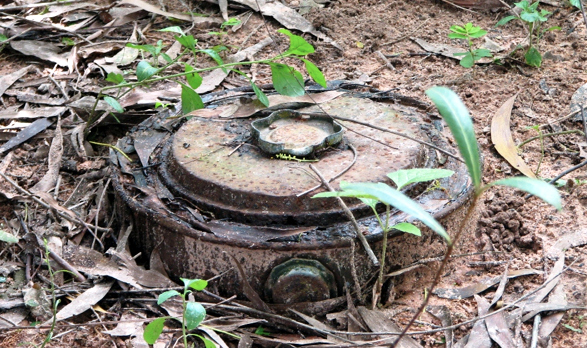Mozambique: Lawyers accuse Luanda court of vetoing judiciary mission
Landmines a major cause of death at Zim-Moz border

Landmines planted along the Zimbabwe-Mozambican during the country’s liberation struggle have over the years continued being the major causes of deaths of humans and animals in Nyamapanda in Mashonaland East Province.
In an interview, Zanu-PF Mudzi Rural District Council councilor for Ward 1, Boyi Nyamande said landmines littered along the Zimbabwe-Mozambique border were a cause for concern as they have continued to be major causes of deaths to both humans and livestock.
Nyamande said the problem has been compounded by the slow pace of clearing the landmines being undertaken by the Zimbabwe Defence Forces and other non-governmental organisations.
“We daily live in fear. We have lost thousands of cattle and hundreds of people have lost their lives and limbs after stepping on the landmines that were planted during Zimbabwe’s armed liberation struggle,” said Nyamande.
Nyamande said a recent meeting held between the rural district council and organisations involved in the demining exercise revealed that despite the critical shortage of funds, the actual exercise was so testing that it needed more manpower and time.
In view of the cumbersomeness of the process, an organisation called Hallow Trust recently recruited 15 people from Mudzi District to undergo a rigorous six months training exercise. The group, Nyamande said, comprised of 10 men and five women.
Nyamande said the area infested with landmines stretches for about 400 km along the border with Zimbabwe-Mozambique border and it is to take several more years to clear all the landmines.
The government recently appealed to the international community to assist with about $100 million required to speed up the demining of the country’s borders after the exercise was allocated $500 000 by treasury last year.
Ministry of Defence secretary Martin Rushwaya told parliament that the money allocated by treasury for the demining exercise was not enough.
Director of the Zimbabwe Mine Action Centre Colonel Mkululi Ncube said anti-personnel mines had since independence killed 1 650 people with 2000 being injured while 8 500 had been left traumatized.
The explosives have reportedly killed over 130 000 domestic animals in Mount Darwin alone where about 3 million anti-personnel mines were planted by the Rhodesian Front during the armed struggle.
Other areas heavily infested with landmines include Victoria Falls to Mlibizi, along the Zambezi River, with 220 kilometres have been cleared of landmines by the United States government while 29 959 anti-personnel mines were cleared by the Zimbabwe National Army.
Mukumbura River is also another area with landmines including Sheba Forest to Beacon Hill Mine Field (50km), Burma Valley (3km), Rusitu to Muzite Minefield (75km) and Sango Border Post to Crooks Corner (50km).
Verification of borders
Besides causing deaths and injuries, the landmines have also stalled the verification of borders on the eastern side of Zimbabwe with Mozambique. The verification exercise was being initiated by the African Union Border Programme (AUBP).
Zimbabwe has already said it is unable to meet the 2017 deadline due to the presence of landmines which are taking long to clear. The Minister of Lands and Rural Resettlement Dr Douglas Mombeshora, whose ministry is leading the demarcating exercise, said the country had verified all other borders except the eastern side with Mozambique.
“We have been working on the verification of our international borders. This is something that AU said must be done by 2017 and a lot of work has been done and we are now left with the southern side that we share with South Africa. The River Limpopo makes most of the boundary and there is not a problem. We have done some few kilometres but as you go further there is a problem of landmines near Nyamapanda border,” said Dr Mombeshora.
Since African countries attained independence, the borders which were drawn by the colonial powers in the context of their scramble for territories have over the years become source of conflict as the borders are poorly defined. The programme by the AUBP is part of efforts by African states to meet the challenges related to the management of borders inherited from colonialism.












Leave a Reply
Be the First to Comment!
You must be logged in to post a comment.
You must be logged in to post a comment.